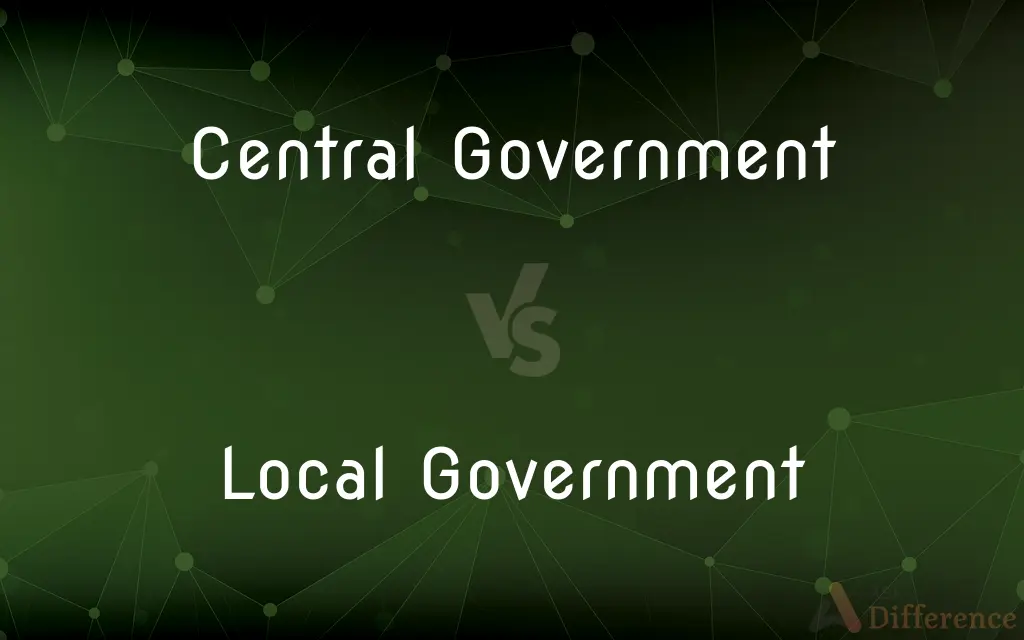Central Government vs. Local Government — What's the Difference?
Edited by Tayyaba Rehman — By Fiza Rafique — Updated on April 22, 2024
Central government operates at a national level, managing the country's overall governance and international relations. Local government functions at a more localized level, such as cities or counties, focusing on community-specific issues.

Difference Between Central Government and Local Government
Table of Contents
ADVERTISEMENT
Key Differences
The central government holds the highest level of authority in a country's political system, responsible for national policy, defense, foreign affairs, and economic management. It creates laws and regulations that apply across the entire nation and ensures the country's security and international standing. Local government, on the other hand, deals with the administration of local areas, such as cities, towns, or counties. It is closer to the citizens and addresses daily issues like local road maintenance, public schools, waste collection, and local law enforcement.
The relationship between central and local governments varies by country and is defined by the national constitution or laws. Some countries have a more centralized system where the central government has significant control over local affairs, while others adopt a decentralized approach, granting substantial autonomy to local governments.
Funding and financial management also differ, with the central government typically collecting taxes and redistributing funds to local governments based on various criteria. This financial relationship is crucial for local governments to carry out their responsibilities effectively.
Despite their differences, both central and local governments are essential for a balanced and efficient governance system, ensuring that citizens' needs are met at both national and local levels. The interaction and cooperation between these two levels of government play a critical role in the country's overall development and well-being.
Comparison Chart
Level of Authority
Highest level, national focus
Lower level, community focus
ADVERTISEMENT
Responsibilities
National defense, foreign policy, fiscal policy
Education, public safety, infrastructure
Geographical Scope
Entire nation
Specific local areas (cities, counties)
Law-making
Creates laws applicable nationwide
Implements local ordinances within national framework
Funding
Collects taxes, redistributes to local governments
Receives funding from central government; may also collect local taxes
Compare with Definitions
Central Government
Manages international relations.
Negotiates treaties with other countries.
Local Government
Implements policies reflecting community needs.
Zoning laws tailored to local development plans.
Central Government
Responsible for national defense.
The central government maintains the country's military.
Local Government
Handles education at the local level.
School boards manage public schools in their district.
Central Government
Governs at the national level.
The United States federal government creates immigration laws.
Local Government
Ensures public safety.
Local governments fund police and fire services.
Central Government
Sets fiscal policies.
Determines national taxation and budgeting.
Local Government
Maintains local infrastructure.
Repairs roads, manages public parks, and provides waste collection services.
Central Government
Oversees national infrastructure projects.
Funds highways and bridges across the country.
Local Government
Manages community-specific issues.
A city council sets local noise ordinances.
Common Curiosities
Why is local government important?
It ensures that the specific needs and preferences of individual communities are addressed, providing tailored services and policies.
How do citizens interact with these levels of government?
Citizens interact with local governments more frequently through community services and local elections, while interaction with the central government occurs through national elections and policies affecting the whole country.
Can local governments create their own laws?
Yes, but these laws cannot contradict national laws and must fit within the framework established by the central government.
How does the central government support local governments?
Through financial allocations, policy frameworks, and national programs that local governments can adapt or implement locally.
How does decentralization affect governance?
Decentralization can enhance governance by bringing decision-making closer to the people, improving responsiveness, and allowing for more tailored solutions to local issues.
What happens if there's a conflict between central and local government policies?
Typically, national law prevails, and mechanisms exist in most countries to resolve such conflicts.
Can a policy be successful at the central level but fail at the local level?
Yes, due to differences in local needs, resources, and implementation capabilities, a policy that works nationally may not be as effective locally.
What role do local governments play in education?
They manage public education systems, including schools and educational programs, tailored to the needs of their communities.
How are disputes between central and local governments resolved?
This varies by country but often involves judicial review or a specific legislative process for resolving conflicts.
Are there areas where both central and local governments have jurisdiction?
Yes, in many areas such as education, transportation, and public safety, both levels of government play a role, requiring coordination and cooperation.
Share Your Discovery

Previous Comparison
NIV vs. KJV
Next Comparison
iMacros vs. GreasemonkeyAuthor Spotlight
Written by
Fiza RafiqueFiza Rafique is a skilled content writer at AskDifference.com, where she meticulously refines and enhances written pieces. Drawing from her vast editorial expertise, Fiza ensures clarity, accuracy, and precision in every article. Passionate about language, she continually seeks to elevate the quality of content for readers worldwide.
Edited by
Tayyaba RehmanTayyaba Rehman is a distinguished writer, currently serving as a primary contributor to askdifference.com. As a researcher in semantics and etymology, Tayyaba's passion for the complexity of languages and their distinctions has found a perfect home on the platform. Tayyaba delves into the intricacies of language, distinguishing between commonly confused words and phrases, thereby providing clarity for readers worldwide.
















































